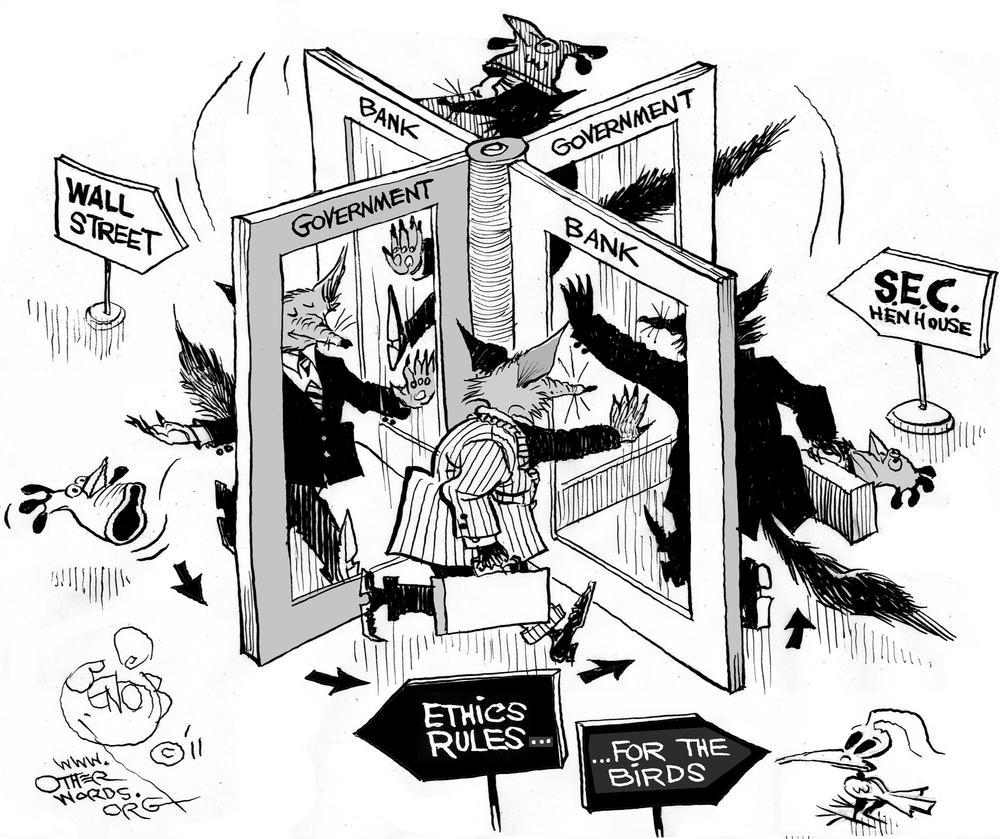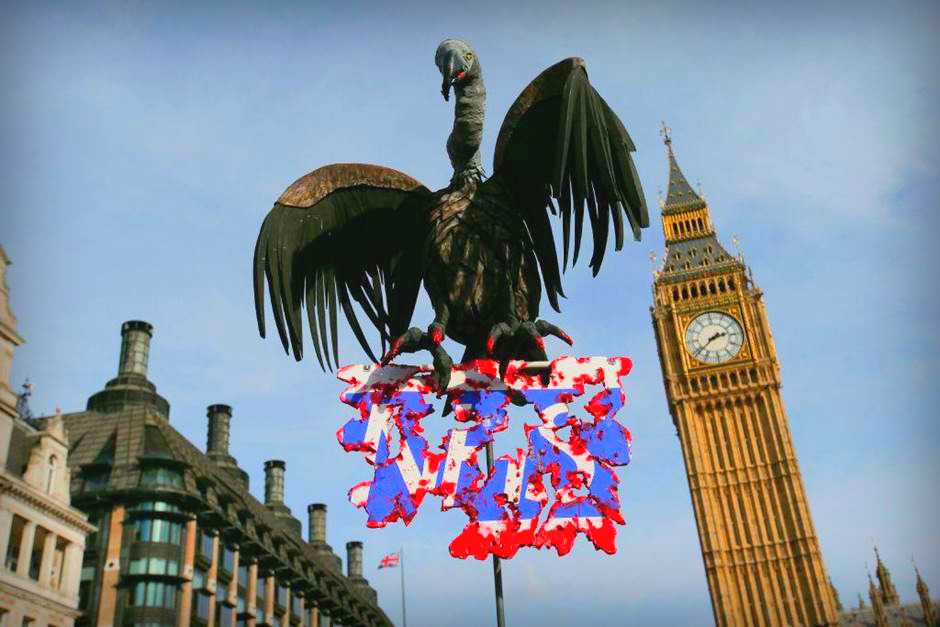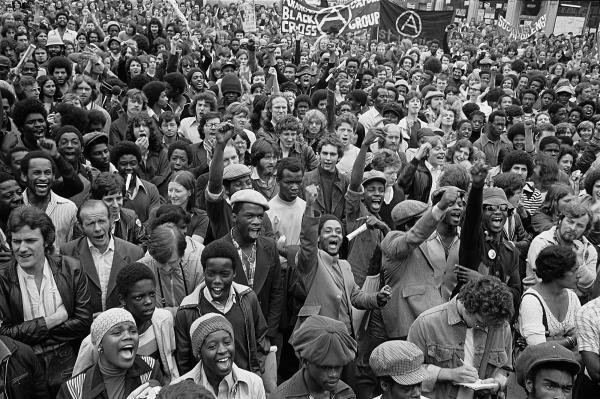Lenin once remarked that the state is “bound by a thousand threads to the bourgeoisie”. But what exactly does this mean? Is it true of the state today?
The state has not existed for all of eternity. In fact, for most of our existence on this planet humans have done without it. Only when the development of tools and technique created a surplus, producing more than was necessary for society simply to survive, did society split into classes and the state arise.
Society became split into those who possessed property and those who didn’t. The early forms of private property required a guardian: “special bodies of armed men” to protect the possessors from the non-possessors,as Friedrich Engels explained in his famous work on the Origin of the Family, Private Property, and the State. This was the state – a product of irreconcilable class antagonisms.
The state has developed since its early beginnings, but its fundamental function remains the same. It has simply become a more refined tool of the ruling class. The state today consists of groupings of ‘armed bodies of men’, from the police and the army to the prisons and courts. These are used to defend the property rights of the rich, while depriving ordinary people the rights to things like housing and a decent standard of living.
The modern state administers and serves the capitalist system using its judges, politicians, officials, bureaucracy and armed bodies of men. In Britain, as elsewhere, this relationship is secured through the interconnection between the tops of the civil service, government officials and the upper echelons of big business, known as the ‘revolving door’. The revolving door is the interchange of senior officials from positions of public office to jobs in the private sector, and vice versa.
A Transparency International survey found that the ‘revolving door’ between government and big business comes a close second in rankings of potentially corrupt activities. It is common practice for government regulators and policy-makers to go on to work for the corporations that they are supposed to be regulating. It is so common that there is an expectation – a de facto incentive – for senior officials to go on to get lucrative jobs in the private sector. Senior state officials thus share the same interests and perspectives as their future big business employers.
This is not just a case of a few surreptitious deals between closed doors, or a few rogue defectors. It is the product of the state’s role as a tool by which the ruling class maintain their property, power, and privileges.
Monitoring
 The state dresses itself up as an impartial arbiter in society. Judges like to say that the law stands above the class struggle and applies equally to everyone. Politicians like to say that we have free and fair elections that return truly representative Parliaments. In fact, this is all window-dressing for the dictatorship of the banks and big business that really runs society behind closed doors and in shadowy corridors.
The state dresses itself up as an impartial arbiter in society. Judges like to say that the law stands above the class struggle and applies equally to everyone. Politicians like to say that we have free and fair elections that return truly representative Parliaments. In fact, this is all window-dressing for the dictatorship of the banks and big business that really runs society behind closed doors and in shadowy corridors.
Nowhere is the window-dressing more obvious than when it comes to the state’s pretence that the ‘revolving door’ isn’t a problem. The Advisory Committee on Business Appointments (ACOBA) is a body set up in 1975 to monitor the employment of outgoing ministers and senior officials. It is supposed to reassure us that the state and big business are entirely separate. It imposes a two-year ban on lobbying for former ministers and senior civil servants – though there is no way of enforcing this. ACOBA’s recommendations are a formality that can and have been openly ignored.
The ACOBA committee, composed of eight, is picked from the same elite circles that it supposedly regulates. For example, committee member Mary Jo Jacobi was George Bush’s Assistant Commerce Secretary, as well as being employed at HSBC, Lehman Brothers and BP – an example of someone who has revolved both in and out.
ACOBA has not refused a single appointment since 2010 for ministers and senior civil servants. Since they only publish appointments they have approved, and advise those found unsuitable to withdraw their application, the whole process remains opaque.
ACOBA only monitors future employment of Director Generals and Permanent Secretaries – a fraction of the workforce. Directors and Deputy Directors are key for developing policy, delivering services, making decisions and negotiating contracts. But their future employment is not scrutinised by anyone.
Why are corporations so keen to employ former ministers and civil servants? Firstly, they have influence over former associates. Secondly, it provides an insight into how the government negotiates and access to confidential information that would bolster their chances of winning contracts or preferential treatment in regulation.
MoD
 ACOBA, between 2000 and 2014, accepted applications for 600 former ministers and senior civil servants to be appointed in over 1,000 jobs in the private sector. It is the rule, not the exception, that those who manage the interests of big business via the state go on to lucrative jobs in the private sector.
ACOBA, between 2000 and 2014, accepted applications for 600 former ministers and senior civil servants to be appointed in over 1,000 jobs in the private sector. It is the rule, not the exception, that those who manage the interests of big business via the state go on to lucrative jobs in the private sector.
As early as 2004, just a year after the Iraq war began, the transfer of personnel from the Ministry of Defence (MoD) department to defence contractors was described as trafficking.
There is a long list of ex-defence secretaries and senior MoD staff, the architects of British foreign policy, who subsequently became advisers at leading arms and security companies.
It’s no surprise then that the MoD has a habit of handing out lucrative contracts to companies such as BAE systems. This occurs despite examples such as the Nimrod programme, contracted to BAE, that was cancelled in 2010 after it was £800 million over budget, as well as nine years late; or the Astute class submarines, also contracted to BAE, which ended up costing £2 billion over budget.
War has always been profitable for the capitalist class. Imperialist states wage war and big business gets rich from these. Thus between 1996 and 2012, over 3,500 senior military officers and MoD staff subsequently went to work for arms companies. As the Campaign Against Arms Trade (CAAT) have stated time and time again, this goes beyond individual decisions:
“The traffic to the private sector is part of the process of the public interest becoming conflated with corporate interest: it becomes normal to unquestioningly meet, collaborate and decide policy with the arms industry, then take work with it.”
The cosy relationship between the government, Whitehall departments, and arms companies is a systemic issue. The term ‘conflict of interest’ misses the mark. In fact, the opposite is true: there is a clear convergence of interest between representatives of the capitalist state and the capitalist class. Behind the crocodile tears of politicians lies the deep underlying motive for waging war and arming despotic gangsters: profit.
The NHS
 Under New Labour, outsourcing and PFI proliferated to new heights. Blair considered the revolving door essential to his reforms. A flood of executives was brought into the corridors of Whitehall to boost ‘efficiency’.
Under New Labour, outsourcing and PFI proliferated to new heights. Blair considered the revolving door essential to his reforms. A flood of executives was brought into the corridors of Whitehall to boost ‘efficiency’.
The PFI Taskforce was pioneered by Adrian Montague, a former investment banker who has since been knighted. The ten members of the taskforce, all drawn from private industry and finance, included: Barclays chief executive Martin Taylor to review welfare and benefits; British Airways Chairman Lord Marshall to review energy policy; and Northern Foods Chairman Lord Haskins to review regulations.
As expected, this was very efficient from the perspective of big business. But for the rest of us, privatisation and outsourcing has led to the corrosion of our services. Take for example the NHS. Class struggle secured universal healthcare. But for as long as the capitalists are calling the shots, that working-class victory is under threat.
Alan Milburn, the health secretary 1999-2003, set the precedent. He introduced the NHS foundation trusts in 2002 and fought for the ‘modernisation’ of the NHS. After his resignation, he became an advisor to Bridgepoint Capital, a firm involved in financing NHS privatisation. Patricia Hewitt, the next health secretary, cut 17,000 jobs and public health spending, while welcoming PFI expansion. After her departure from politics she became special advisor to private equity company Cinven, which bought Bupa’s UK hospitals.
Mark Britnell, the director general of commissioning at the NHS, left his job in 2009 in order to become Head of Healthcare at KPMG. His successor, Gary Belfield, resigned in 2010 and became an associate partner for the health practice at KPMG. Both men were in favour of privatising swathes of the NHS. Britnell even declared in 2011 that “the NHS will be shown no mercy and the best time to take advantage of this will be in the next couple of years”, to a room full of private health company representatives. Both men shaped policy and worked personally with the people handing out contracts. KPMG have made successful bids for NHS contracts ever since.
The expansion of corporations into the NHS has been facilitated by government policy that consciously underfunds the service. Under pressure to maximise profits for big business, the government is trying to open new avenues of profit for the capitalist class by outsourcing the most profitable procedures.
Only a break from the logic of capitalism can put an end to this by putting power irrevocably into the hands of the working class, who can run healthcare on the basis of need, not profit.
Crony capitalism
 It was commented back in 2010 that British politics needs to “come clean about who is buying power and influence” in an attack against “crony capitalism”. These were the words of David Cameron.
It was commented back in 2010 that British politics needs to “come clean about who is buying power and influence” in an attack against “crony capitalism”. These were the words of David Cameron.
These remarks proved hollow when the coalition government introduced new measures to ensure the revolving in of business executives to Whitehall. All government departmental boards now have ‘non-executive directors’ (NEDs) of which 80% have careers in business, commerce and finance. Lord John Browne, the former CEO of BP, was appointed by Cameron as the ‘lead non-executive director’ at the Cabinet Office.
In a report, Browne speaks of NEDs acting as in-house consultants. They enjoy access to the most senior and sensitive decision making and use their expertise to ‘mentor’ senior officials. The appointment is for a three-year term, but many leave early, or only serve one term. There was no mention in Browne’s report about the potential conflict of interest.
The interests of the career bureaucrats and business executives at Whitehall have become so intertwined that the civil service is now more clearly than ever simply a committee for managing the common interests of the British ruling class.
As stated in a recent report, the revolving in of business executives to government substantiates the claim that “the corporate elite has colonised the government”. This includes businessmen appointed as ministers through the House of Lords; the use of secondments by corporations; and the temporary appointment of special advisers from the private sector who return back to their private companies after their appointment is over.
John Manzoni, the first ever chief executive of Whitehall appointed in 2014, reflects this scandalous state of affairs. Manzoni has quite the track-record: as an executive for BP he was criticised for the BP Texas refinery explosion; as CEO of energy company Talismas he was fined $60,000 for alleged violations of hazardous chemicals on numerous sites. Lord Browne, his former boss who was on the appointment committee, rewarded his integrity and commitment to the public with salary of £190,000.
Capitalism vs democracy
 The liberal press and politicians complain that ACOBA is all sound and fury but no action. This is ironic since they could be accused of doing the same thing! In fact, they do it in a more refined way: they speak boldly about reforms, littered with empty words like ‘accountability’, ‘transparency’ and ‘democracy’.
The liberal press and politicians complain that ACOBA is all sound and fury but no action. This is ironic since they could be accused of doing the same thing! In fact, they do it in a more refined way: they speak boldly about reforms, littered with empty words like ‘accountability’, ‘transparency’ and ‘democracy’.
Lenin was correct in stating that a “fully consistent democracy is impossible under capitalism” since bourgeois democracy is a thin veil for the dictatorship of capital. In a similar vein Rosa Luxemburg argued that parliamentarianism simply expresses capitalist society: “a society in which capitalist interests predominate”. As is the case in the ‘freest’ of capitalist countries, senior posts in the public service are used as a ‘springboard’ to lucrative posts in the private sector.
The contradiction between capitalism and genuine democracy is expressing itself in many ways: the rejection of establishment politics that has swept the globe; democracies committed to austerity, degrading the living standards of the masses, and safeguarding capitalists’ profits; a warmongering foreign policy over which people have no real say.
The Public Administration Select Committee, as early as 2009, pointed out that former ministers can ‘use with impunity the contracts they built up as public servants to further a private interest’. Calls for reforms like a ‘statutory board’ fail to grasp where the issue lies.
The revolving in of business executives, and the so-called colonisation of the government by the corporate sector, is just a symptom. The root cause is that the state is tied by a thousand threads to the capitalist system which it has been designed to defend.
Power to the workers
 The only real solution to this endemic is to dismantle the current bureaucratic capitalist state machine and create a state apparatus that is under the control of the organised working class: a democratic workers’ state.
The only real solution to this endemic is to dismantle the current bureaucratic capitalist state machine and create a state apparatus that is under the control of the organised working class: a democratic workers’ state.
This would fill all posts – administrative, judicial, educational, legislative – by democratic election, with representatives and officials accountable to the labour movement through the right of recall at any point. It would also uproot bureaucracy and careerism by paying representatives the average wage of a skilled worker.
And above all, it would reduce the hours of the working week, freeing up time so that all workers have the opportunity to participate in the running of society through their workplace and communities. As Lenin once remarked, once everyone is a bureaucrat, no-one is a bureaucrat.
Revolutionary movements from the Paris Commune of 1871 to the occupied factories in Venezuela and Brazil today provided embryonic examples of such workers’ democracy in action, with workers running society and workplaces for themselves in this way.
Society could be run for the working class, by the working class. Ordinary people could have the time to participate in the democratic process, and not be alienated from it, through the reduction of working hours and employment secured for all. The capital that sits idle in the banks, due to the capitalists’ lack of profit incentive to invest, would be expropriated and reinvested based on social need.
In place of the hollow ‘democracy’ we have today, we could have real democracy through which the working class can take control of their lives. This is only possible if society as a whole owns the means of production. As long as the key levers of the economy – ‘the commanding heights’ – remain in private hands, then how can they be democratically controlled?
Combined with a rational plan of production and workers’ control of the economy, we would see society flourish to new heights. Capitalism and its exploitative, oppressive, corrupt machinery, as Engels noted, will be consigned to the “museum of antiquities, by the side of the spinning wheel and the bronze axe”.






